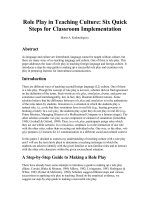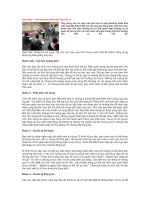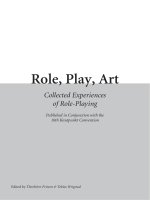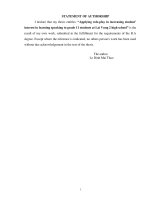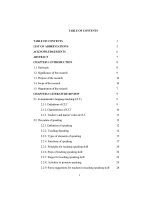role play activities presentation
Bạn đang xem bản rút gọn của tài liệu. Xem và tải ngay bản đầy đủ của tài liệu tại đây (1022.23 KB, 23 trang )
UNIT 20
Role play
Aims of this unit
-To establish what role play is and why it is
important.
-To show how to organize controlled role play
based on a dialogue or text.
-To show how to organize free role play
activities.
Role
play
I. Introduction.
II. Improvising dialogues.
III. Interviews based on the text.
IV. Free role play.
Organizing free role play.
Situations for free role play.
Conclusion.
I. Introduction
4
Workbook Activity 1
Which activity would be the easiest for your
students to do? Which would be the most
difficult? Why?
What other roles and situations would be
suitable for role play activities in your own
class?
I.Introduction
5
Role play is a way of bringing situations from
real life into the classroom. When we do role
play, we ask students to imagine.
+ Students may imagine:
1. A role: in other words, they pretend to be
different person.
2. A situation: in other words, they pretend to be
doing something different.
3. Both a role and a situation.
6
Suitable roles :
- People familiar to students from everyday
life : parents, sisters, teachers, police
officers, venders…
- Characters from the textbook, and from
other books ( stories, novels…) or from TV.
Suitable situations:
-Situations which students see or take part
in in everyday life : shopping, holidays,
asking the way to places, picnics, parties,
traveling by bus…
- “ Fantasy” situations from stories they
read, or from the textbook.
7
II. Improvising dialogues
8
Role play can often be based on a dialogues
or text from the textbook.
Role play gives students a chance to use the
language they have practiced in a more creative
way.
Workbook Activity 2
1.What role play activities could be based on
this dialogue?
2.Plan a similar role play based on a dialogue.
Note: Give the prompts.
Should improvise.
9
The conversation should be
similar to the one in the
textbook, but not exactly the
same.
The conversation can be
shorter than the presentation
dialogue, but it can cover
the main points.
10
11
There are two ways of organizing this:
Could ask one or two “good” pairs of
students to improvise a conversation in front
of the class, and divide the class into pairs to
have similar conversations.
Could ask students to practice the role play
privately in pairs first, and then ask one or
two students to perform in front of the class.
Plan a role play activity:
- what short conversations could be
developed, based on the dialogue or text;
- what roles the students could take;
- what prompts could be
written on the board to
guide the role play.
12
III. Interviews based on a text.
Workbook Activity 3
What role play activities could be based on
these texts?
13
14
Role play interviews are a way of bringing a
text to life and making it seem real to the
students.
They are simple to organize, and can easily
be done in a large class.
The activity is more likely to be successful in
a large class if all students have a chance to
prepare questions.
15
IV. Free role play.
Organizing free role play.
Situation for free role play.
Conclusion.
Organizing free role play:
Preparation in the class
-The whole class:
+ Discussing what the speakers might say;
+ Writing prompts and any key vocabulary
on the board to guide the role play.
-The class into pairs:
+ Let them discuss together what they
might say;
+ Let them all “try out” the role play
privately, before calling on.
16
Homework for students
17
-Students divide into pairs or mall groups,
choosing their own partners. Each group
chooses one of topic to role play.
- In their own time, each group prepares their
role play.
- The teacher arranges a time for each group to
perform their role play.
Situations for free role play
18
Situations for free role play are based on the
same general topics.
Workbook Activity 4
Which of these topics are covered in the
textbook you use?
What other topics does the textbook cover?
Home, family
Local places
Food and drink
Health
School,
education
Free time, interests,
sports
Jobs
The world
19
Holidays
???
Conclusion:
20
Role play increases motivation. Always
talking about real life can become very
dull, and the chance to imagine different
situations adds interest to a lesson.
Role play gives a chance to use
language in new contexts and for new
topics.
21
Children and even teenagers and adults
often imagine themselves in different
situations and roles when play games.
Role play encourages students to use
natural expressions and intonation, as
well as gestures.
Improvising
dialogues
Introduction
Role play
Interviews based
on a text
Organizing
free role
play
Free role
play
Situations
Conclusion
for free
role play
THANKS FOR YOUR LISTENING
Goodbye!!!!
